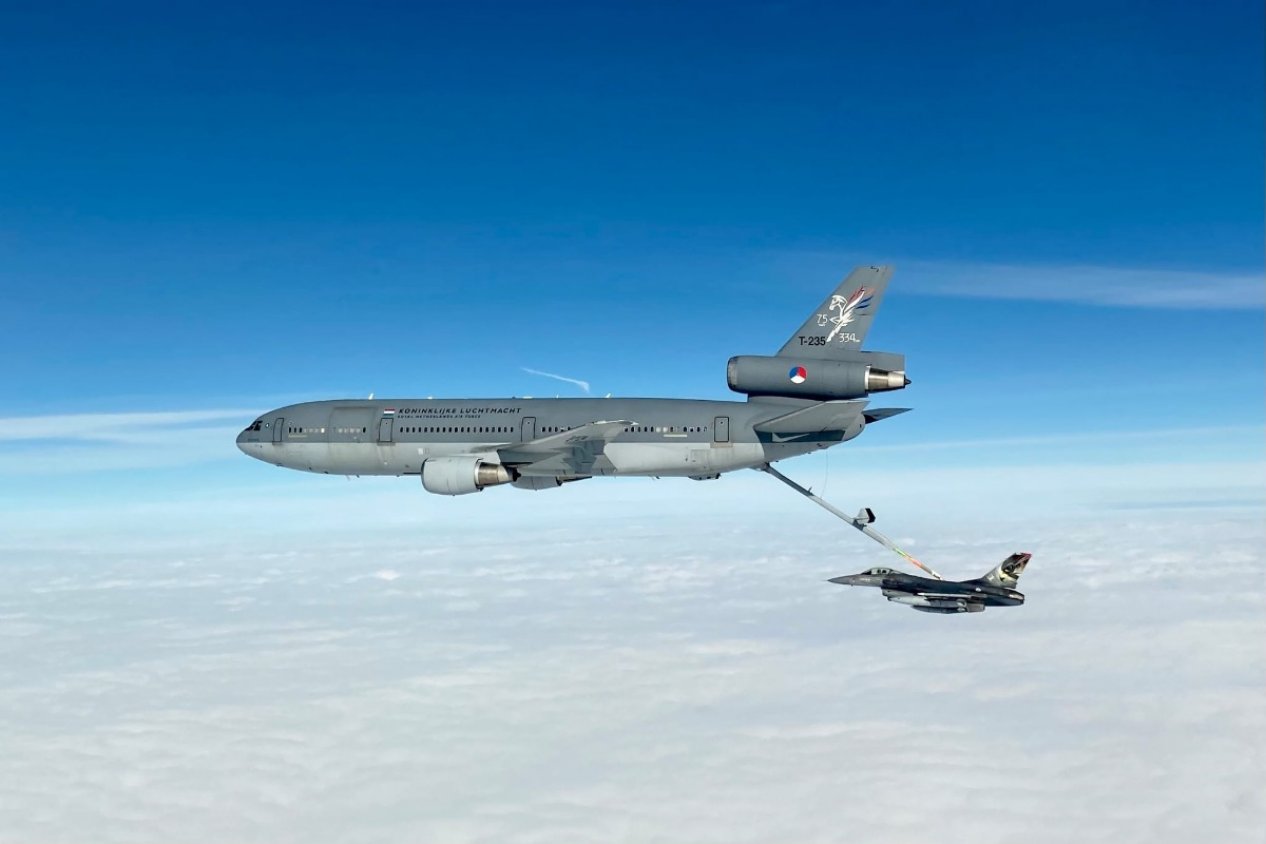
On September 21 and 22, the third Ramstein Alloy exercise this year saw Allied and Partner air forces come together to conduct live-fly training in the Baltic States and international airspace over the Baltic Sea. This iteration of the Ramstein Alloy exercise series was hosted by Lithuania, with Allies Denmark, Italy, Poland, Portugal, and Turkey and NATO Partner Finland, as well as NATO E-3A AWACS, cooperating together during the varied training drills. A Royal Netherlands Air Force KDC-10 air-to-air refueling aircraft and a Lithuanian Air Force C-27 transport plane also enabled the training activities.
Telegram channel ‘Major and General’ posted the following in connection with the completion of the third stage of the exercise: In this post, the author criticized the actions of the Turkish pilots. The channel writes that “in the course of summing up the results, the allies in the bloc noted extremely low professionalism of the Turkish crew, especially in managing the actions of the allies’ fighter and military transport aviation. It is also reported that the Turkish pilots poorly organized interaction with the Combined Air Operations Centre of NATO and NATO E-3A AWACS from the NATO Air Base Geilenkirchen, Germany. Just as during the second phase of these exercises, held at the end of June 2021, the inept actions of the E-7T crew during air-to-air refueling are noted. The actions of the Turkish pilots in these exercises not only showed insufficient professionalism, but also raised doubts among the NATO leadership about their involvement in such events next year.”
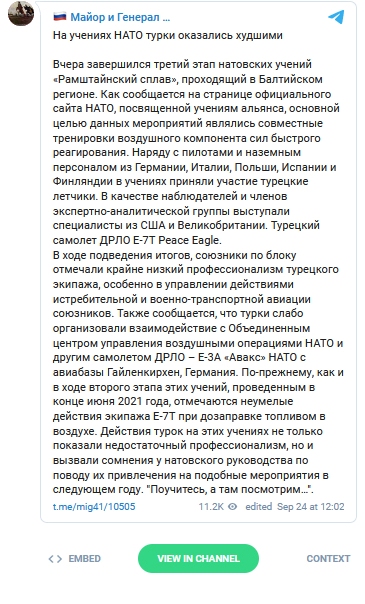
We will try to figure out to what extent what has been said corresponds to reality.
We were unable to find the assessments attributed to NATO specialists either on the alliance’s website or on its Facebook page. But in the process of searching, we came across positive feedback about Turkish pilots and aircraft. “The Turkish Air Force did show a high level of air maneuvering skill in Malbork Poland when flying with a Polish CASA C-295 full of photojournalists. NATO aircrew regularly conduct joint training and exercises demonstrating transparency about our mission activities. This builds confidence, stability and ensure the Alliance airspace security, safety and that of its users is maintained.”
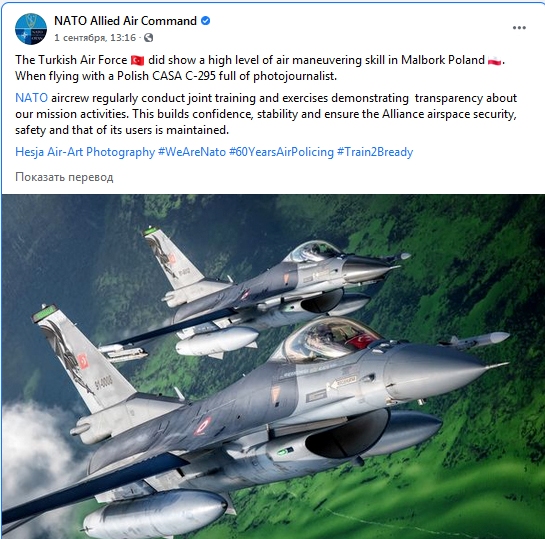
“The Polish Air Force C-295M, with a dozen international journalists on board, took off from Malbork, Poland, to join the aerial training session of Turkish F-16 in the skies above eastern Poland. The photographers had the chance to see and document first-hand the precision and professionalism involved in Allied aerial operations. Media days like this promotes NATO’s Transparency and Capability.”
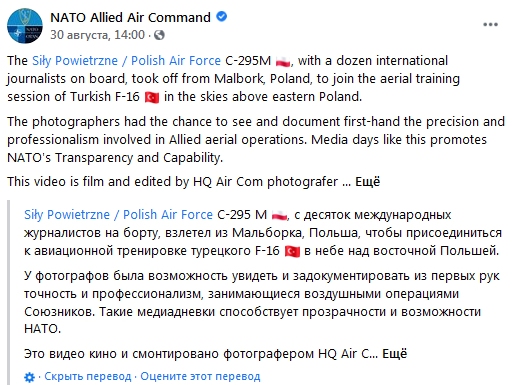
The NATO website says that fighter jets from the United States and Turkey were taking up NATO Air Policing duties, guarding the skies over Iceland and over the Baltic region.
“We thank our Allies the United States and Turkey for contributing to NATO’s Air Policing missions”, said NATO spokesperson Oana Lungescu. “Air Policing helps keep our skies safe and secure round the clock. This is a clear example of Alliance solidarity in action, demonstrating that NATO has the capabilities and the resolve to protect all Allies," she said.
The Facebook page of the Turkish National Defense Ministry reads that “During Ramstein Alloy 2021 Exercise, Turkish Air Force’s AEW&C E-7T aircraft conducted prevention training over Estonia together with aircraft of Finland and Spain. Turkish AEW&C E-7T aircraft performed command and control mission for the first time in European airspace.”
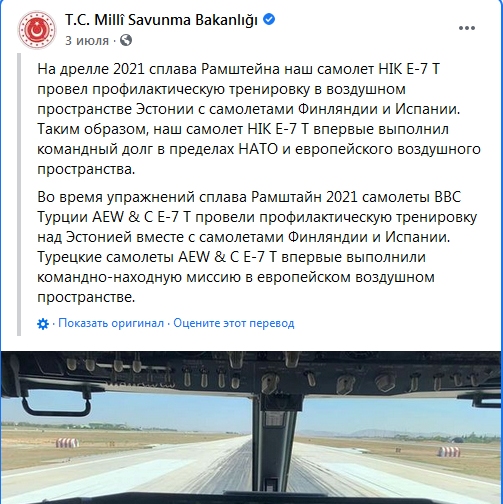
The Boeing B737-700 ‘Peaceful Eagle’ (Baris Kartali) aircraft, which is in service with the Turkish Air Force, was handed over to Estonia for participation in NATO exercises.
In a statement issued by the Turkish National Defense Ministry in April, it was reported that, as part of NATO’s safeguards measures, the E-7T Peace Eagle carried out missions for the first time in the airspace of another NATO country.
Turkey’s E-7T AWACS aircraft conducted a mission over NATO-allied Romania’s airspace for the first time, Turkey’s National Defense Ministry reported earlier.
“As part of NATO Assurance Measures, Turkish E-7T AWACS aircraft conducted a mission over a NATO allied country airspace for the first time. Air picture was shared via Link-16 with Romanian Control Reporting Center during the mission conducted on the 16th of April over Romania,” the ministry said in a statement on its website.
“Surface picture and electronic support activities were also performed and relayed to CAOC (Combined Air Operations Centre) Torrejon, as part of the mission conducted over Romania,” the statement added.
Video footage was posted on the Twitter account of NATO, which describes Turkey’s contribution to the bloc.
"NATO is a family of common values. We are united with our Allies for peace and stability. #Turkey is NATO, #WeAreNATO," the alliance said on Twitter.
"Every day, NATO Allies work and train together to keep you safe. Through partnership and cooperation, NATO has secured peace and freedom for 70 years," it added.
In the video clip, Lt. Col. Esra Özatay, a jet pilot of the Turkish Air Forces, said that the allies share common values and "stand together" to protect them and each other.
She said Turkey’s support for NATO dates back to 1952, when the country joined the alliance, and added that Turkey is one of the largest contributors to NATO missions and operations.
Özatay also expressed her pride that the first jet pilot in the alliance was Turkey's Leman Bozkurt Altincekic, who has been "an inspiration" for many young people to join the army.
"Every NATO member has an equal voice. We take decisions together. United, we are stronger and safer," she said.
In general, Turkey is very serious about the issue of training flight personnel. A program of accelerated training of pilots for the needs of the country’s Air Force is being implemented.
After the coup attempt on July 15, 2016, more than 600 pilots associated with the terrorist movement of Fethullah Gulen were expelled from the ranks of the military aviation. The Turkish Ministry of National Defense launched an accelerated program to fill the staff deficit. In general, thanks to the measures taken, in less than two years the number of pilots of the Turkish Air Force again neared 1,000 people.
Strengthening pilot training domestically is important as the US had stopped training Turkish F-35 pilots since 2019.
The United States decided to stop accepting any more Turkish pilots who had planned to train in the United States on F-35 fighter jets, three US officials said, in a sign of an escalating dispute over Ankara’s plans to purchase Russian air defenses, Reuters reported.
The two NATO allies sparred publicly for months over Turkey’s order for Russia’s S-400 air defense system, which Washington said posed a threat to the Lockheed Martin Corp F-35 stealthy fighters, which Turkey also planned to buy.
Thus, as the above-mentioned facts show, Turkey, despite some contradictions with the United States, remains one of the important NATO members and the Turkish Air Force continues to demonstrate skill and professionalism.




















